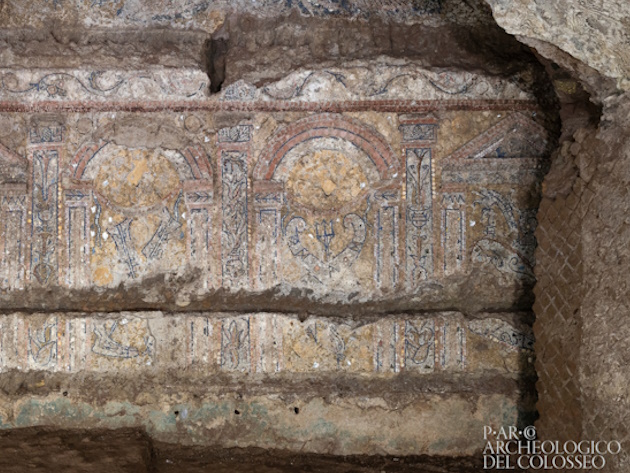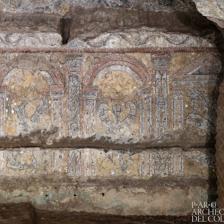
The scientists of the Parco Archeologico del Colosseo have unearthed some rooms of a magnificent domus dating back to the late Republican age located in the area where, in the Augustan age, stood the Horrea Agrippiana, the famous warehouses built by Marcus Vipsanius Agrippa, Augustus's son-in-law, along the Vicus Tuscus, the commercial road that connected the river port on the Tiber and the Roman Forum.
The domus is spread over several floors, probably terraced, and is distinguished by three building phases that can be circumscribed between the second half of the 2nd century BC and the end of the 1st century BC.
The ancient residence is built around an atrium/garden and its main room is a specus aestivus, a banquet hall built in imitation of a grotto to be used especially during the summer season and animated by scenographic water games, thanks to the passage of some lead pipes found inside the decorated walls.
In the same room, and this is what makes the discovery exceptional, is an extraordinary wall covering in 'rustic' mosaic, datable to the last decades of the 2nd century B.C., made of various shells, Egyptian blue tesserae, precious glass, minute flakes of white marble and other types of stone, fragments of spongy travertine and pozzolan cretons. The mosaic reproduces a complex sequence of symbolic figures including vine and lotus leaf shoots, stacks of weapons with Celtic-type trumpets (carnyx), ships' prows with tridents, helms with triremes that perhaps refer to a double triumph, terrestrial and naval, of the owner of the domus, an aristocratic personage, probably of senatorial rank.
Finally, the evocative depiction, in the large overhanging lunette, of a walled coastal city with small towers, porticoes and gates and facing a sea ploughed by three large ships, one with raised sails, could allude to a warlike conquest.
Photo: Domus del Vicus Tuscus - Ph. Archivio Parco archeologico del Colosseo, Simona Murrone
 Condividi
Condividi












































